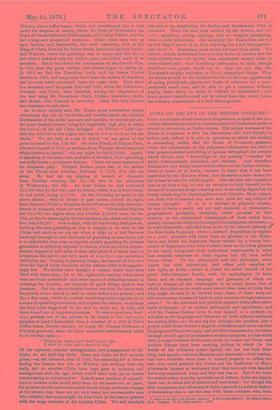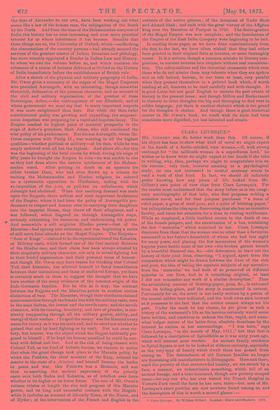INDIA ON THE EVE OF THE BRITISH CONQUEST.* INDIA is
a subject of real interest to Englishmen, in spite of the pro- verbial determination of their representatives in Parliament never to attend to, or even at, an Indian debate. The proper business of the House of Commons is with the discussions that lead directly to action, and, indeed, it is only on questions on which the country is demanding action that the House of Commons possesses either the information or the judgment—themselves the fruit of that general conflict and sifting of opinion throughout the country which Milton calls " knowledge in the making "—needed for useful Parliamentary discussion and decision. And therefore Parliament very wisely leaves Indian affairs to the Indian Govern- ment at home or in India, content to know that it has been appointed by the Minister whom they themselves have chosen for his fitness to rule the whole empire. Like the man who explained that as he kept-a dog he saw no occasion to bark himself, so the House of Commons sleeps, knowing that it can safely depend on its trusty watch-dogs in Downing Street and Calcutta. How, indeed, can India fail to interest any man who cares for any subject of human thought ? If he is a student of physical science, he sees in India a world, not yet half explored, of phenomena, geographical, geological, botanical, either peculiar to that country, or the unexpected counterparts of those which have- already become the subjects of completed investigation elsewhere,--46 as when Humboldt, excluded from India by the absurd jealousy of the East India Company, wrote a learned disquisition to explain on a priori grounds why there were no glaciers in the Hima- layas, and found his ingenious theory refuted by a young lieu- tenant of Engineers, who, with Forbes's book on the Swiss glaciers in his hand, recognised their undoubted counterparts in what less scientific observers in those regions had till then called frozen rivers. To the ethnologist and the philologer, what region has such attractions, and offers such supplies of new light, as India,—where is found the eldest branch of ther great Indo-Germanic family, with its mythologies, its fairy tales, and its Sanskrit language and grammar, of which we have in Europe all the counterparts in so many forms, but of which the oldest are so much more recent than those of India that they might all seem to be derived from these, if there were not still more reason to trace all back to some common though unknown source ? To the historical and political inquirer India offers other fields of thought : if he prefers philosophy and speculation, and with Sir Thomas Browne loves to lose himself in a mystery, he will find in the language and literature of India infinite materials for stating fully—we do not say for solving—the problem how a people could attain to such a stage of civilisation and culture as that language and literature imply, and yet there be arrested in its course through untold ages of permanence without progress; so that while their younger brothers of the same stock in Greece and Rome and modern Europe have been creating polities in which (in the words of the Athenian orator Lysias) the law has been their king, and speech—rational discourse and discussion—their teacher, and have recorded their lives in history properly so called, the race who could produce the Vedas and the Institutes of Menu afterwards became so stationary that they have not even handed down any account of when and why this was so. But if we want the events rather than the speculations of history, India can supply these too, in forma full of interest and instruction : for though the first conquerors and colonisers of India have left no written history of themselves, this is not the case with those invaders who, from • India on the Eve of the British Conquest. A Historical Sketch. By Blaney Owen, MA. London W. H. Allen and Co. 1872. the days of Alexander to our own, have been working out what seems like a law of the human race, the subjugation of the South by the North. And from the time of the Mohammedan conquest of India this history has an ever-increasing and ever more practical interest for us whose inheritance it has become. Sensible that these things are so, the University of Oxford, which—outflanking the obscurantism of the country parsons—bad already secured the services of the greatest master of Indian literature and philology, has more recently appointed a Reader in Indian Law and History, to whom we owe the volume before us, and which contains the substance of a course of lectures delivered at Oxford on the History of India immediately before the establishment of British rule.
After a sketch of the physical and military geography of India, Mr. Owen gives a summary of the reigns of the Mogul Emperors who preceded Aurungzib, with an interesting, though somewhat rhetorical, delineation of the personal character, and an account of the civil and military organisation, of the greatest of those Sovereigns, Acber,—the contemporary of our Elizabeth, and of whose government we must say that in many important respects it was more enlightened than hers. But while the then ruder constitutional polity was growing and expanding, the magnani- mous despotism was preparing for a rapid and hopeless decay. The Empire reached its highest point of material prosperity in the reign of Acber's grandson, Shah Jehan, who still continued the wise policy of his predecessors. But his son Aurungzib, whom Mr. Owen compares with Philip II., was wanting in all the highest qualities—whether political or military—of his race, while he was amply endowed with all but the highest. And above all—for this was the beginning of the fatal course by which during his reign of fifty years he brought the Empire to ruin—he was unable to rise as they had done above the narrow intolerance of his Moham- medan creed. After putting to death as an apostate his eldest brother Dam, who had even drawn up a scheme for uniting the Mohammedan and Hindoo religions, he entered on a systematic opposition to Hindooism, ending with the re-imposition of the jezia, or poll-tax on unbelievers, which Jehangir had abolished. When this insulting demand was made upon the Rajputs, those noblest and most important feudatories of the Empire, whom it had been the policy of Aurungzib's pre- decessors to respect and honour even to marrying their daughters into the imperial House, they threw off their allegiance, and a war followed, which lingered on through Aurungzib's reign, seriously exhausting his resources, and undermining his power. And meanwhile a still mightier Hindoo power—that of the Marattas—had sprung into existence, and was beginning a series of still more fatal attacks on the Mogul Empire. The Rajputs- "Sons of Kings "—claimed to be therepresentativesof the Kshatria, or Military caste, which formed one of the four ancient divisions of the Hindoo race, and their claim has been always attested by their singularly military character, not only in actual fighting but in their feudal organisation and their personal sense of honour : and though Mr. Owen may have reason for thinking that Colonel Tod, their historian, has allowed himself to fancy resemblances between their institutions and those of medimval Europe, yet there is certainly much in them to suggest the thought that we have _here another of the many evidences of the common origin of the Indo-Germanic families. But be this as it may, the contrast between the Rajputs and the Marattas points to another curious distinction of race. The Marattas, though their chieftains claimed some connection through the female line with the military caste, were in the main Sudras, the lowest and the servile caste; and the servile character, with its cunning, treachery, and love of plunder, is con- stantly reappearing through all the military genius, ability, and energy of their warfare. 'To spoil the enemy' was the Maratta's very /lame for victory, as it was his main end, and he cared not whether he gained that end by hard fighting or by craft. But not even vic- tory, but honour, was the object which the Rajput habitually pro- posed to himself ; if he kept his honour unsullied he could be con- tent with defeat and loss. And at the risk of being classed with Colonel Tod, as too fond of historic fancies, we venture to notice that when the great change took place in the Maratta polity, by which the Peishwa, the chief minister of the King, reduced his master to the state of a faineant and himself became the leader in peace and war, this Peishwa was a Brahmin, and was tints re-asserting the ancient supremacy of the priestly caste over both Sudra and Kshatria, as of intellect over force whether in its higher or its lower forms. The rest of Mr. Owen's volume relates at length the rise and progress of this Maratta power, and its long and successful contests with the Moguls ; while it includes an account of Aliverdy Khan, of the Nizam, and of Hyder ; of the intervention of the French and English in the contests of the native princes ; of the invasions of Nadir Shah and Ahmed Shah; and ends with the great victory of the Affghan king over the Marattas at Paniput in 1760. The disintegration of the Mogul Empire was now complete ; and the foundations of the Empire of the East India Company were beginning to be laid.
In reading these pages, as we have done conscientiously from the first to the last, we have often wished that they had either been printed in their original form as lectures, or more thoroughly recast. It is a serious, though a common mistake in literary com- position, to convert lectures into chapters without real reconstruc- tion. The colloquialisms and the rhetorical ornaments which even those who do not admire them may tolerate when they are spoken and so left behind, become, to our taste at least, very painful when they present themselves in a printed book which, if worth reading at all, deserves to be read carefully and with thought. It is good Latin but not good English to narrate the past events of history in the present tense ; and though Milton and Burke resort to rhetoric to utter thoughts too big and thronging to find vent in colder language, yet there is another rhetoric which is too grand for the thoughts it clothes. And though there is good historical matter in Mr. Owen's book, we could wish its style had been sometimes more dignified, yet less laboured and ornate.



































 Previous page
Previous page